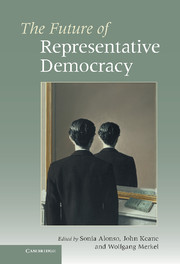Book contents
- Frontmatter
- Contents
- List of figures
- List of tables
- Notes on contributors
- Acknowledgements
- Editors' introduction: Rethinking the future of representative democracy
- 1 Representative democracy and its critics
- 2 Representative democracy and the populist temptation
- 3 The wider canvas: representation and democracy in state and society
- 4 Performance and deficits of present-day representation
- 5 Do parliaments have a future?
- 6 Engendering representative democracy
- 7 Representative democracy and the multinational demos
- 8 Diagnosing and designing democracy in Europe
- 9 Monitory democracy?
- 10 Representing nature
- 11 Democracy and representation beyond the nation state
- General bibliography
- Index
- References
9 - Monitory democracy?
Published online by Cambridge University Press: 05 June 2012
- Frontmatter
- Contents
- List of figures
- List of tables
- Notes on contributors
- Acknowledgements
- Editors' introduction: Rethinking the future of representative democracy
- 1 Representative democracy and its critics
- 2 Representative democracy and the populist temptation
- 3 The wider canvas: representation and democracy in state and society
- 4 Performance and deficits of present-day representation
- 5 Do parliaments have a future?
- 6 Engendering representative democracy
- 7 Representative democracy and the multinational demos
- 8 Diagnosing and designing democracy in Europe
- 9 Monitory democracy?
- 10 Representing nature
- 11 Democracy and representation beyond the nation state
- General bibliography
- Index
- References
Summary
This chapter proposes a fundamental revision of the way we think about representation and democracy in our times. It pinpoints an epochal transformation of the contours and dynamics of representative democracy. It tables the claim that from roughly the mid-twentieth century representative democracy began to morph into a new historical form of ‘post-parliamentary’ democracy, and it explores some of the reasons why this change happened. It proposes that ‘end of history’ perspectives and maritime metaphors (Huntington's ‘third wave’ of the sea simile has been the most influential) are too limited to grasp the epochal change – too bound to the surface of things, too preoccupied with continuities and aggregate data – to notice that political tides have begun to run in entirely new directions. My conjecture is that the world of actually existing democracy is experiencing an historic sea change, one that is taking us away from the assembly-based and representative democracy of past times towards a form of democracy with entirely different contours and dynamics of representation.
It is hard to find an elegant name for the new form of democracy, let alone to describe in a few words its workings and political implications; at stake is the tricky task of crafting a plausible ‘wild category’, a creative neologism that descriptively sums up and makes good analytic sense of novel developments that cannot otherwise be grasped through ‘tame’ prevailing categories (Eco 1999: 232 ff.).
- Type
- Chapter
- Information
- The Future of Representative Democracy , pp. 212 - 235Publisher: Cambridge University PressPrint publication year: 2011
References
- 38
- Cited by



